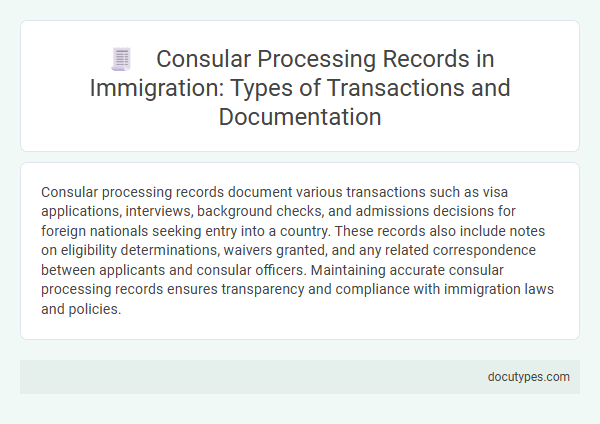Consular processing records document various transactions such as visa applications, interviews, background checks, and admissions decisions for foreign nationals seeking entry into a country. These records also include notes on eligibility determinations, waivers granted, and any related correspondence between applicants and consular officers. Maintaining accurate consular processing records ensures transparency and compliance with immigration laws and policies.
Overview of Consular Processing in Immigration
Consular processing records document various transactions related to visa applications, interviews, and background checks conducted by U.S. consulates abroad. These records include details on immigrant visa petitions, medical examinations, security clearances, and final adjudication decisions. Understanding what types of transactions are recorded can help you track the progress and outcomes of your immigration application efficiently.
Key Types of Consular Transactions
Consular processing records document various transactions related to immigration applications handled at U.S. embassies or consulates. These records help track the status and history of visa petitions and other consular activities.
- Visa Petition Filings - Records include initial submissions of immigrant and non-immigrant visa petitions by applicants.
- Interview Appointments - Documentation of scheduled and completed consular interviews conducted to assess visa eligibility.
- Visa Issuances and Denials - Final decisions on visa applications, including approvals, rejections, or requests for additional evidence, are recorded.
Your consular processing information is essential for verifying your visa journey and immigration status updates.
Essential Documentation for Consular Processing
| Transaction Type | Description | Essential Documentation |
|---|---|---|
| Visa Application Submission | Records the initial filing of an immigrant or non-immigrant visa request at a U.S. consulate or embassy. | Form DS-260 or DS-160, passport, photo, filing fee receipt, and application confirmation page. |
| Document Verification | Verification of submitted documents including civil records, police certificates, and proof of relationship. | Birth certificates, marriage certificates, police certificates, and financial support evidence (e.g., Form I-864). |
| Medical Examination Records | Records confirming the applicant's completion of a U.S. Department of State-approved medical exam. | Medical examination report, vaccination records, and immunization history. |
| Interview Scheduling and Results | Details on interview appointment dates, location, consular officer notes, and final decision outcomes. | Interview appointment letter, appointment confirmation, and consular officer's decision documentation. |
| Background and Security Checks | Documentation related to FBI checks, name checks, and other security clearances. | Fingerprint records, FBI clearance certificates, and security screening reports. |
| Visa Issuance or Denial | Official record of visa approval, issuance stamps, or denial notices including grounds for refusal. | Visa issuance pages, refusal letters, and notification forms like the DS-3032. |
| Petition and Supporting Document Review | Review and validation of underlying immigrant petitions filed with USCIS, such as family-based or employment-based petitions. | Form I-130, Form I-140, and other petition approval notices. |
Immigrant vs. Nonimmigrant Visa Records
Consular processing records document various types of transactions related to visa applications, including interviews, approvals, denials, and background checks. Immigrant visa records primarily involve permanent residency applications, petitions, and supporting documents that establish eligibility for lawful permanent residence. Nonimmigrant visa records focus on temporary visits for tourism, employment, study, or business, capturing information about visa issuance, renewals, and compliance with visa conditions.
Consular Interview Records and Procedures
Consular processing records document key transactions involved in visa application procedures conducted at U.S. embassies or consulates. These records primarily focus on consular interviews and related administrative steps essential to immigrant visa issuance.
- Consular Interview Records - Detailed documentation of your visa interview, including questions asked, answers provided, and officer observations.
- Application Review and Verification - Records showing the verification of submitted documents and background checks performed by consular officers.
- Final Decision and Issuance - Entries indicating the visa approval, denial, or issuance dates along with any conditions attached to the visa.
Supporting Evidence for Consular Applications
Consular processing records document various transactions involved in visa and immigration applications handled by U.S. consulates abroad. These records include essential supporting evidence submitted to validate eligibility and authenticity for consular applications.
- Identity Verification Documents - Copies of passports, birth certificates, and national identification cards verify the applicant's identity and citizenship.
- Proof of Relationship - Marriage certificates, adoption papers, and family photos demonstrate familial connections required for family-based immigration petitions.
- Financial Support Evidence - Affidavits of support, tax returns, and employment letters confirm the petitioner's ability to financially sponsor the immigrant, ensuring no public charge burden.
Recording Decisions: Approvals, Denials, and Waivers
Consular processing records document various immigration transactions, including visa applications, interview outcomes, and background checks. These records specifically capture decisions made on your case, providing detailed accounts of approvals, denials, and granted waivers.
Approvals indicate successful eligibility for entry or immigration benefits, while denials specify reasons for refusal. Waivers reflect exceptions granted for certain grounds of inadmissibility, often requiring extensive review and supporting evidence.
Updating and Amending Consular Records
Consular processing records document various immigration-related transactions, including visa applications, interviews, and background checks. These records also capture updates and amendments made to personal information or case statuses throughout the process.
Updating and amending consular records ensure accuracy and reflect any changes in your circumstances, such as name corrections, updated travel plans, or new supporting documentation. These modifications help maintain the integrity of the immigration process and facilitate effective communication between consulates and applicants. Keeping records current minimizes delays and supports successful visa issuance.
Privacy and Security of Consular Documentation
Consular processing records document various types of transactions including visa applications, background checks, and interview results. These records also capture personal information, travel history, and eligibility determinations relevant to immigration.
Ensuring privacy and security of consular documentation is critical to protect sensitive personal data from unauthorized access. Strict protocols and encryption methods safeguard these records throughout the processing lifecycle.
What Types of Transactions Are Recorded in Consular Processing Records? Infographic

